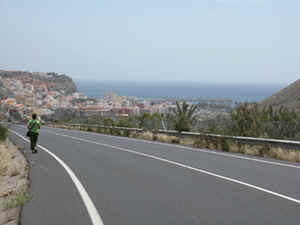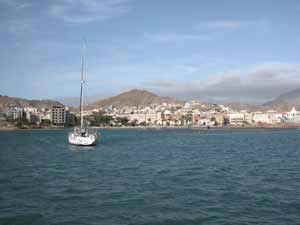
|
Before we left La Gomera we (I) were determined to visit a restaurant that had been recommended to us on the outskirts of town - 20 minutes to get there because it's uphill and ten minutes back. An hour later, slogging up hill in the midday sun we still hadn't found it. "Just round one more bend" we (I) kept saying. "Bet it's closed on Wednesdays" we (Lindy) kept joking. We finally found it. Not only was it genuinely closed on Wednesdays, it was also for sale and looked as if it had been closed on every other day for some time. How we (I) laughed as we turned round to slog back to town before the restaurants closed. The silver lining to this story was that we flagged down a taxi a few minutes later and had him deliver us to the spectacularly beautiful Parador overlooking the bay for an excellent lunch in luxurious surroundings. |
 |
||
|
In fact it would have been very easy not to leave La Gomera, not only is it a lovely place but also setting sail from there would be another major step. It would be our longest passage together so far (850miles) and we would be leaving the last outpost of Europe and the associated cheap flights. Most of all it would commit us to crossing the Atlantic - sailing back north would be very, very long and arduous. But it was now May and we needed to be on our way. The winds south of the equator become progressively more southerly as the year progresses and this would make the trip to Brazil more difficult. So we studied weather forecasts - grib files, surface analysis, text, etc. Meteo France were saying "rough", which for us translated as "stay in Gomera and get a Chinese take-away". Roger and Margaret on Golden Fleece, who we had just met and were also headed to Brazil via Cabo Verde, decided to leave anyway - obviously made of sterner stuff we thought. These decisions are always ultimately judgement calls, particularly on trips of more than a couple of days. We have a huge amount of weather information available nowadays and short range forecasting is pretty reliable, but after 3 or 4 days the accuracy starts to deteriorate rapidly. So delaying your departure for a day or so to avoid a system may just mean that you get caught by the next one a week later that you would have missed if you'd left earlier! On this occasion though our decision to delay by 24 hours seems to have been the right one. We kept in contact with Golden Fleece via HF radio and although our first 48 hours were quite hard, their crossing seems to have been much tougher and for much longer.
|
|||
|
It always feels that we should have more to write about the passages themselves, but the truth is that we pretty quickly settle into the rhythm of 3hours on 3 hours off. During the night that means sleep, watch, sleep, watch and during the day rest, watch, rest - All interspersed with play with sails, cook, fish, fix things, make water, make electricity, etc, etc. Oh, and of course remove dead flying fish and occasional squid from deck every morning. If the weather is bad and you are on watch, you find a corner out of the wind/rain and poke your head up every 15 minutes to check for shipping, and hope you won't have to do anything exciting with the sails. Then go off watch, try to sleep and hope that the weather will be nicer when you wake up. If the weather is good, then you can spend hours just watching stars, waves, dolphins, etc.
|
|||
 |
Our landfall was the town of Mindelo, the capital of the island of São Vincente and one of the three locations in Cabo Verde where we could clear in. This is a very well protected (though windy) natural harbour with ferry/freighter/container terminals and an anchorage populated with rusty freighters. Some of these look as if they will never move again, some are clearly in active service and all look as if they belong in another age. Gentle reinforcement for us that this was Africa! We could see Golden Fleece and half a dozen other yachts anchored in a corner of the bay. Dusk was falling rapidly so we quickly dropped our anchor close to them to settle down for a night of uninterrupted sleep - luxury! Actually, we raised and lowered our anchor twice more before we were finally happy with our position relative to the other yachts and a freighter loading on one of the wharfs. Our settling down was further delayed by a visit from our first "boat boy" who had had himself rowed out to offer his services. Actually "boy" is normally a misnomer as in this case - a guy of about 40 with a noticeable lack of dentition and also, as it turned out, a noticeable lack of English after "I like to help people". We settled on Spanish as a vaguely common language and agreed to speak with him again in a couple of days when we had slept and having discovered that the whole island was closed tomorrow for a public holiday in memory of the death of Bob Marley! |
||
|
"Boat boys" are a feature of sailing in the third world. As we've said they often aren't boys and they even more often don't have boats, but apart from that ..... They turn up as soon as you arrive offering a host of services - guard your dinghy/boat, help you with immigration, fetch and carry, find stuff, etc. They can be extremely useful, and employing them is a small way of contributing to what are often desperately poor economies. They're all rogues of course, it goes with the territory, and some of them can also be complete wasters and the difficult trick is to try and pick yourself a good rogue. After a day at anchor we moved across onto the single rickety and expensive pontoon that was Mindelo marina. This isn't to be sniffed at though as it is the only marina in the whole of the Cape Verdes and it certainly made the task of clearing in and getting ashore a lot easier (there is nowhere to land a dinghy easily). The marina situation is set to change though as a long-awaited 200 boat "proper" marina is under construction in the bay - the pontoons are now in. This will obviously make Mindelo a much more attractive stop for sailors on their way to the Caribbean and will be good for the local economy, but it is already filling up the best of the anchorage. Clearing in on paper looked to be an arduous task, but in the event it was simple and the officials seemed genuinely pleased to see us, were charming and helpful, epitomised by the young customs corporal who cleared us in - entering our details slowly in a large ledger with different coloured pens for each column. And this probably sums up our overall impression of Mindelo - a step back in time. A bustling dusty place with faded pastel coloured buildings, poverty, but not starvation and welcoming, helpful people.
|
|||
|
Our only other landfall in the Cape Verdes was to be Porto da Praia on Santiago the capital of the archipelago. We had planned to visit elsewhere, but the wind had other ideas. Our first contact there was a Frenchman with only one visible tooth (there just didn't seem to be enough teeth to go around in the Cape Verdes) and little English, He had completed four Transat races and now lived aboard his catamaran and spent his life between the Cape Verdes and the Azores. We never managed to understand his name, but we did understand that he thought this a totally unsuitable time to sail to Brazil (something about not enough wind). Just a tad concerning as he seemed, in our minds, to be the living embodiment of Bernard Mortessier. There was also a price for this confidence sapping advice - I lost my expensive prescription sunglasses over the side whilst helping him into his dinghy. Portugal has left two legacies in all of its ex-colonies - its language and its bureaucracy. The latter requires visits to multiple officials with boat papers and passports at each new port in spite of having already cleared into the country. This also remains the case in Portugal inspite of its membership of the EU! Our first requirement on arrival at Praia was to visit the port captain. After a few days delay for a public holiday, the weekend and too much wind we finally attempted to get ashore to see him. The port captains' office is unaccountably situated behind the beach on the other side of the bay from the port and separated from it by a valley. This meant that the shortest route for the visit was a slightly dodgy beach landing in the dinghy. "Not to be attempted if any surf is running" it says in the pilot and it's right. We were rolled by an incoming breaker as we approached the beach. For the record, in case you've never tried it, being upside down under a few hundredweight of RIB and outboard in breaking surf is a very good remedy for constipation! It's also an exceptionally good way of losing your prescription sunglasses. Not a problem for me of course, but that's where Lindy's went. Things would have been much more difficult without the help of the dozen or so beach boys who leapt into the sea, hauled ashore the dinghy, our possessions and us and even attempted the impossible task of trying to find Lindy's sunglasses. When we were ready to leave they also carried the boat to the safer end of the beach and up to their chests in water held it steady whilst we got aboard and got the sodden engine started - all the time in a mixture of languages, questioning us about British football teams. In the meantime one of them had also delivered us to the port captains' office where we dripped comprehensively on his floor - we were ushered outside to complete formalities, probably in record time, leaning against the office wall. Praia was very different from Mindelo. The harbour area and the city centre both had a much less wholesome feeling, something to do with being the capital and the largest city by a long way I suppose. This feeling was compounded by more obvious signs of poverty and when George the boat boy, employed to clean and guard the boat, stole a knife and a small door mat, which was very stupid as we were paying him more per day than their value and he stole them on the first day and so was immediately sacked. The ageing (and you've guessed it - virtually toothless) Tanaka replaced him on the recommendation of the Port Captain, turned out to be completely reliable and a genuinely nice guy who we last saw standing in his boat stripped to the waist and waving us goodbye with his shirt when we finally left the island. |
|||